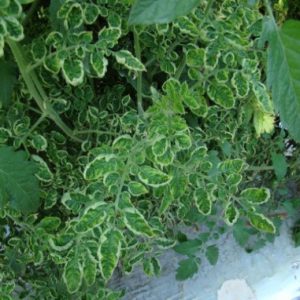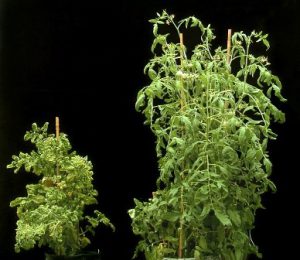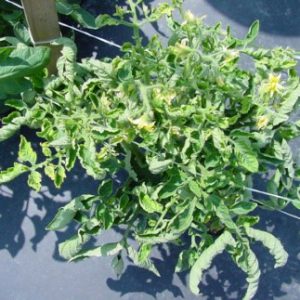Tomato season in Suwannee County is here. Your small seedlings are now large plants that are producing yummy fruit! As we continue to enter the summer months, temperatures will continue to rise and just like humans, insects like to get out of hiding and enjoy the warm weather. This means pests will start to encroach on your tomato plants. An insect you may notice on your tomatoes are whiteflies, which are insects that can transmit viruses to your plants. One virus that you may see is the Tomato Yellow Leaf Curl Virus (TYLCV), which can greatly impact your plants. Read on to find out more about this virus’ effect on tomatoes.
What is the Tomato Yellow Leaf Curl Virus?

Tomato Yellow Leaf Curl Virus (TYLCV) affects both commercial tomato fields and home gardens. It was first identified in 1997 in South Florida and spread rapidly to North Florida the following year. TYLCV is transmitted to a plant by an adult silverleaf whitefly. One whitefly can inoculate more than one plant, making them an efficient vector for the virus. Whiteflies are small white insects found on the top and bottom of leaves. You can check your plant for whiteflies by simply running your hand through the plant foliage and seeing if small white insects start to fly off the plant.

Identification:
Effects of TYLCV on tomato plants can start at an early growth stage and continue throughout their life cycle. Plants can exhibit yellowing of leaf edges, reduced leaf size, upward cupping of leaves, dropping of flowers, lack of fruit production, and growth stunting. Unfortunately, diagnosing TYLCV based on the symptomology mentioned, can be unreliable because other viruses or adverse growing conditions can also cause similar symptoms. It is important to send suspected samples to the UF Diagnostic Lab for proper identification.
Crop Damage:

The damage from TYLCV can be quite severe. TYLCV affects plants at all growth stages, so it is important to monitor for whiteflies and the virus throughout the entire season to decrease potential infection on the crop. The virus affects the foliage of tomato plants and inhibits the plants ability to produce fruits, greatly diminishing yield. Symptoms within a field can be random or found in clusters. It is important to remove infected plants from your field early and quickly to prevent further transmission of TYLCV from whiteflies. Covering the infected plant with a plastic bag before removing will help capture whiteflies that could potentially transmit the virus to other healthy plants in your field. Remove the plant from you field and dispose of appropriately.
Cultural Controls:
- Choose cultivars with resistance to TYLCV
- Use virus-free transplants
- Use reflective mulches
- Avoid planting new tomato crops next-to or downwind from old tomato fields
- Clean up fields after harvest – old tomato plants and weeds can become hosts
- Practice crop rotations
Chemical Controls:
Since whiteflies transmit TYLCV to tomato plants, it is important to control whiteflies when present in your field. Make sure to scout for them in your crop during late spring, summer, and early fall. Also, create a spray schedule for controlling whitefly populations throughout the entire growing season. For proper management practices of controlling whiteflies, refer to the Vegetable Production Handbook of Florida for application information on products labeled for use: https://edis.ifas.ufl.edu/pdffiles/CV/CV13700.pdf. Always remember to read the label before applying any chemicals in your field.
UF/IFAS Extension in Suwannee County is an Equal Opportunity Institution.
 0
0
